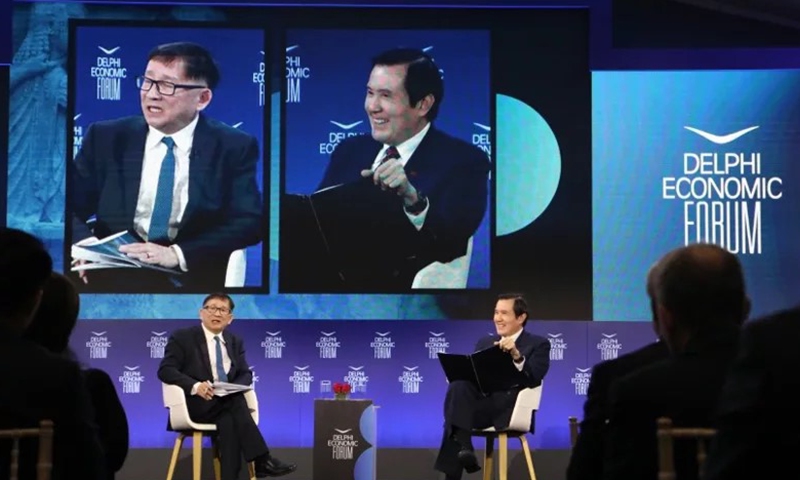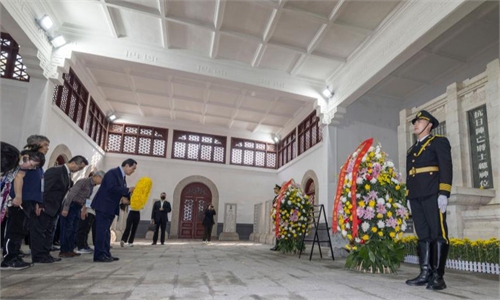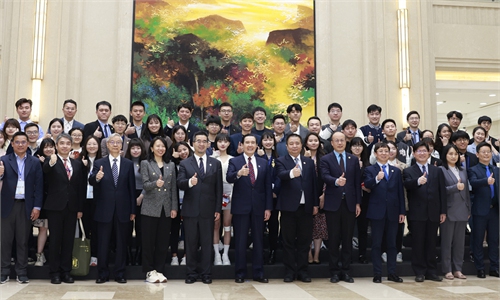DPP’s policy likely to provoke conflict between two sides of Taiwan Straits: Ma Ying-jeou

Ma Ying-jeou photo
Ma Ying-jeou, former regional leader of the Taiwan island, attended a forum in Greece on Friday and shared his experience of his latest trip to the Chinese mainland from March 27 to April 7, saying that the development of the mainland is far beyond his expectation and that the 1992 Consensus, which respects the one China principle, is “a guardrail” for the peace across Taiwan Straits.
Ma also said the Democratic Progressive Party (DPP), currently the ruling party on the island, and the party’s separatist policy that denied the 1992 Consensus are very likely to provoke a conflict, or even a war between the mainland and the island of Taiwan, and this is the topic that needs most attention when it comes to cross-Straits relations.
Ma made the remarks during a conversation with Li Cheng, director of the China Center at the Brookings Institution, while attending Delphi Economic Forum on Friday.
Ma said he plans to invite scholars and students from the mainland to visit Taiwan this the summer, and he hopes the DPP authorities can allow him to do so and not to interrupt the planned exchange.
Ma recalled the exchange that the Taiwan students in his delegation had with their counterparts in the mainland during his trip covering some mainland’s major cities including Nanjing, Changsha, Wuhan, Chongqing and Shanghai, and he said “they got along with each other warmly.”
“In both urban and rural environments, developments in mainland over the last 20 years have been impressive,” Ma said.
Ma said he was also impressed by the mainland’s “extensive high-speed rail network of 40,000 kilometers.” He said “It runs at a very fast speed of 350 kilometers per hour, and is quiet and stable. Its total length is the longest in the world.”
Ma also recalled that officials he met, particularly the local Party chiefs, were mostly well-educated. “Some had PhD degrees, and they were by and large friendly and confident in their conversation with us.”
Ma also addressed the 2024 regional election of the island. Ma said as a political party that supports “Taiwan’s independence,” the DPP has taken a confrontational policy toward the Chinese mainland, while the KMT has an engagement policy with the mainland.
“That’s the major difference. No one is certain if the DPP might change their policy toward the mainland in the future because “Taiwan independence” has been the DPP’s benchmark in Taiwan for many decades,” Ma noted.
Lai Ching-de, the DPP’s candidate for Taiwan’s regional leader election in 2024, has long claimed that he is a “pragmatic worker for Taiwan’s independence,” Ma said. The problem with that is “the independence of Taiwan itself is not a pragmatic policy at all.” This is not supported by the majority of the people on the island and the US, and is vehemently opposed by the Chinese mainland, Ma noted.
Ma said the existence of the 1992 Consensus serves as “a guardrail” for cross-Straits peace. However, the fact that the DPP has so far refused to accept the 1992 Consensus complicated the picture of cross-Straits peace, which remains to be seen whether the DPP would change its non-acceptance policy in the future, he noted.
“If not, the cross-Straits peace will be difficult to come by. Because the DPP’s policy could likely provoke conflict or even war across the Taiwan Straits. This is the most critical element to watch in cross-Straits relations,” said the former regional leader of the island.



